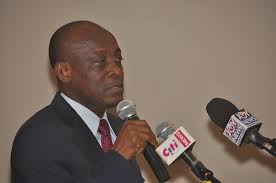 The Ministry of Finance (MoF) disbursed US$114 million to support the first phase of the Natural Resources and Environmental Governance (NREG) programme between 2008 and 2012.
The Ministry of Finance (MoF) disbursed US$114 million to support the first phase of the Natural Resources and Environmental Governance (NREG) programme between 2008 and 2012.
About US$23 million was disbursed annually to the NREG, while US$1 million went into the civil society organisations facility yearly.
Financiers of the programme included the World Bank (US$40 million), the European Commission (US$10.4), the Royal Netherlands embassy (US$45.9 million), the UK Department for International Development (DFID), US$10.7 million, and the Agence Française de Développement (AFD) (US$6.5 million).
At the launch of the Technical Assistance (TA) programme, to support NREG on September 4, 2014 in Accra, it emerged that the Forestry Commission was the highest benefactor and received GH¢62.9 million, representing 43.9 per cent of the programme funds.
The Minerals Commission received GH¢28 million, while the Ministry of Environment, Science, Technology and Innovation had GH¢21 million.
An amount of GH¢4.2 million and GH¢14.1 million went to the MoF and the Ministry of Lands and Natural Resources respectively.
A sum of GH¢13 million, representing 2.9 per cent, was also transferred into the consolidated fund.
The programme was inaugurated in 2008 to improve transparency in systems and procedures for natural resource management.
It was also aimed at ensuring effective forest law enforcement, improved collection of revenues in the mining and forestry sectors, and mainstreaming environment and climate change in economic planning and development.
The Chief Director of MoF, Major Samuel Mahama Tara (RTD), said under the NREG programme, government through the implementing agencies was able to achieve progress in undertaking reforms such as the finalisation of the forest and wildlife policy and the drafting of the climate change strategy and policy.
He said NREG also led to the passage of six regulations to give effect to the Minerals and Mining Act of 2006, as well as the establishment of a multi-agency revenue task force.
He further noted that the programme had supported the Ghana Extractive industry Transparency Initiative (GEITI) in revenue reporting and also strengthened the institutional platform for sector dialogue and the conduct of Strategic Environmental Assessment (SEA) by the Environmental Protection Agency (EPA).
Major Tara (rtd) explained that the NREG/TA would enable the implementers to merge individual and sectorial activities and to refresh stakeholders on the project objectives, key parameters, and how the projects fit into the larger vision of the Ghana NREG programme.
He said the NREG programme had not been able to cut back the effects of the exploitation of the environment by both the legal and illegal mining and forest sector activities, hence the decision to introduce TAP.
“I have been informed that the implementation of the activities under the technical assistance programme has started slowly, but I want to urge all implementing agencies to deliver on the agreed targets and indicators within the project period,” he said.
The Programme Leader, World Bank, Dr Waqar Halder, said NREGTA was among the core activities of the bank’s Ghana Country Partnership Strategy, 2013-2016, which formed the pillar of improving economic institutions.
Thus, the bank is supporting Ghana with US$5 million grant to help strengthen institutional capacity of the key ministries and agencies in the natural resources and environmental sectors.